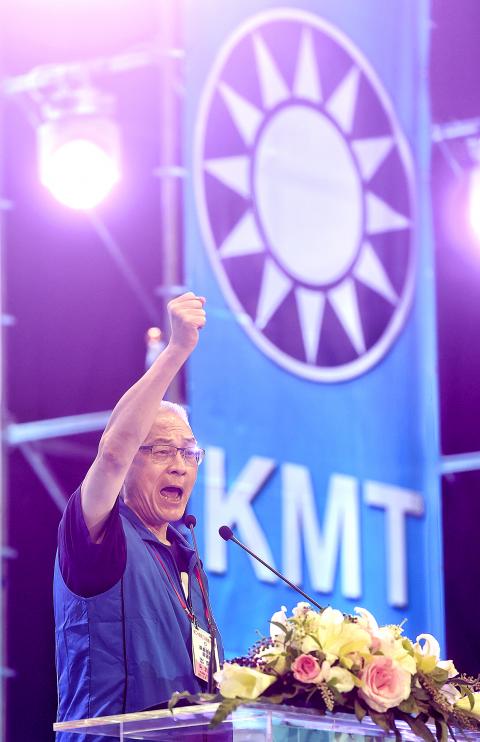The Chinese Nationalist Party (KMT) at its national congress in New Taipei City yesterday vowed to “hit a home run” in the Nov. 24 nine-in-one elections.
KMT Chairman Wu Duen-yih (吳敦義), and former party chairs including former vice president Lien Chan (連戰), former president Ma Ying-jeou (馬英九), former Taipei mayor Wu Poh-hsiung (吳伯雄), New Taipei Mayor Eric Chu (朱立倫) and former legislator Hung Hsiu-chu (洪秀柱) attended the convention, which was held to unite party members and boost the party’s momentum at the start of the campaign season.
Baseball was the theme of the convention, with Wu as the “main coach” and candidates for mayoral and commissioner seats as baseball players. Wu and the candidates posed as if they were ready to swing their bats to “hit a home run” and threw a baseball to symbolize striking out the opponent.

Photo: Fang Pin-chao, Taipei Times
Wu in an address summed up the nation’s accomplishments during Ma’s presidency.
Taiwan’s global ranking for government efficiency has slid over the past two years, Wu said, adding that it shows the KMT is better at managing the economy.
“During the Ma administration, society was harmonious and the economy was stable. By contrast, bananas and pineapples are now piled up because farmers have a hard time selling their produce, as do owners of milkfish farms,” Wu said.

Photo: Chien Jung-fong, Taipei Times
“The tourism industry has also been hit hard and entrepreneurs around Sun Moon Lake, Hualien County and the Alishan National Scenic Area have been earning less than half of what they used to make,” Wu told the convention.
Taiwan was trusted and popular around the world under Ma, Wu said, adding that 164 countries had waived tourist visas for Taiwanese travelers by the time Ma finished his second term as president.
Only 54 countries had waived tourism visas for Taiwanese by the end of Chen Shui-bian’s (陳水扁) presidency, he added.
Wu cited several murder cases in which victims were dismembered as signs of a rising crime rate, saying that they showed how the Democratic Progressive Party (DPP) government has affected the society’s morale.
President Tsai Ing-wen’s (蔡英文) administration has also failed to communicate with people affected by pension reforms, he said, adding that Taiwan has seen its lowest GDP growth since Tsai took office.
Taiwan and China have stopped communicating with one another since Tsai took office in 2016, and the “1992 consensus” is the path to resuming relations, Wu said.
The so-called “1992 consensus,” a term former Mainland Affairs Council chairman Su Chi (蘇起) in 2006 admitted making up in 2000, refers to a tacit understanding between the KMT and the Chinese government that both sides of the Strait acknowledge there is “one China,” with each side having its own interpretation of what “China” means.
Wu also criticized the new 12-year national education curriculum guidelines for history textbooks, which failed to gather more than 50 percent of the review committee’s support.
Adjusting history textbooks as proposed would be illegitimate, Wu said, adding that “Chinese culture is our common ideal and dream.”
All of the party’s 22 mayoral and county commissioner hopefuls are strong candidates, and love Taiwan and its people, Wu said.
If elected, the KMT would build an efficient and decent government, create a booming economy that benefits all, and build a harmonious society and peaceful cross-strait relations, he said.

The manufacture of the remaining 28 M1A2T Abrams tanks Taiwan purchased from the US has recently been completed, and they are expected to be delivered within the next one to two months, a source said yesterday. The Ministry of National Defense is arranging cargo ships to transport the tanks to Taiwan as soon as possible, said the source, who is familiar with the matter. The estimated arrival time ranges from late this month to early next month, the source said. The 28 Abrams tanks make up the third and final batch of a total of 108 tanks, valued at about NT$40.5 billion

Two Taiwanese prosecutors were questioned by Chinese security personnel at their hotel during a trip to China’s Henan Province this month, the Mainland Affairs Council (MAC) said yesterday. The officers had personal information on the prosecutors, including “when they were assigned to their posts, their work locations and job titles,” MAC Deputy Minister and spokesman Liang Wen-chieh (梁文傑) said. On top of asking about their agencies and positions, the officers also questioned the prosecutors about the Cross-Strait Joint Crime-Fighting and Judicial Mutual Assistance Agreement, a pact that serves as the framework for Taiwan-China cooperation on combating crime and providing judicial assistance, Liang

A group from the Taiwanese Designers in Australia association yesterday represented Taiwan at the Midsumma Pride March in Melbourne. The march, held in the St. Kilda suburb, is the city’s largest LGBTQIA+ parade and the flagship event of the annual Midsumma Festival. It attracted more than 45,000 spectators who supported the 400 groups and 10,000 marchers that participated this year, the association said. Taiwanese Designers said they organized a team to march for Taiwan this year, joining politicians, government agencies, professionals and community organizations in showing support for LGBTQIA+ people and diverse communities. As the first country in Asia to legalize same-sex

MOTIVES QUESTIONED The PLA considers Xi’s policies toward Taiwan to be driven by personal considerations rather than military assessment, the Epoch Times reports Chinese President Xi Jinping’s (習近平) latest purge of the Chinese People’s Liberation Army (PLA) leadership might have been prompted by the military’s opposition to plans of invading Taiwan, the Epoch Times said. The Chinese military opposes waging war against Taiwan by a large consensus, putting it at odds with Xi’s vision, the Falun Gong-affiliated daily said in a report on Thursday, citing anonymous sources with insight into the PLA’s inner workings. The opposition is not the opinion of a few generals, but a widely shared view among the PLA cadre, the Epoch Times cited them as saying. “Chinese forces know full well that